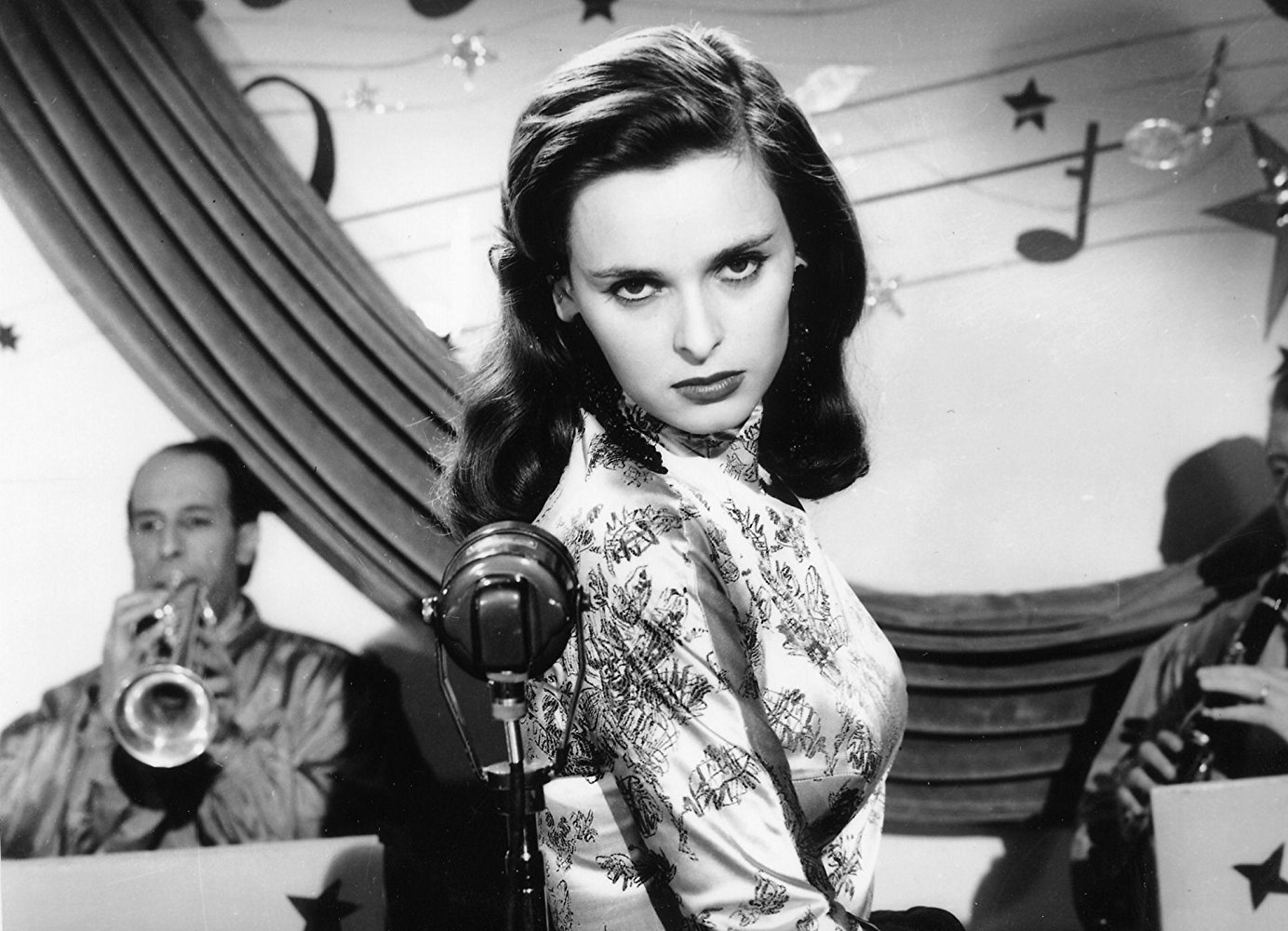
Dir: Michelangelo Antonioni | Drama | Italy
From the opening credits of La Signora Senza Camelie we’re in very recognisable Antonioni territory. First, a close overhead shot of a young woman pacing up and down the street at night: she’s hesitant, anxious and uncomfortably placed against an architecture that appears to disturb her. On the soundtrack we hear a melancholic title theme composed by Giovanni Fusco (Who later worked with Antonioni on L’avventura, L’eclisse and Il Deserto Rosso). Then the woman enters a cinema to catch the final moments of her latest film. As she watches herself, singing in a nightclub, Signora’s filmic intersection of life and art undemonstratively signals what will be the cause of the woman’s continuing stress – the capricious and uncaring Italian film industry of the 1950s.
Clara Manni (Lucia Bose) is a beautiful-looking shop assistant now transformed into a film starlet. After Clara’s first successful film, the movie executives propose a project entitled “Woman Without a Destiny.” Attempts are made to make the film more erotic and provoke the censor. Producer Gianni Franchi (Andrea Checchi) persuades Clara to marry him and commence with the new production. The film does well but Gianni objects to the sexual exploitation of his wife. Upset by the studio’s control of her talent and image, Clara walks out of the marriage and requests a part in a more artistic film. A version of the Joan of Arc story is completed, but is badly received. Clara is shaken by the ordeal and continues to strive for serious roles.
Hollywood would have treated this storyline with either black satire (Sunset Boulevard) or sophisticated critique (The Bad and the Beautiful). But not Antonioni. In interviews he’s said that it was not the workings of film production that interested him but the personality, or soul, of an actress, praised then denigrated by forces that prevent her self-realisation.
Lucia Bose was also the leading actress in Antonioni’s first film, Cronica di un Amore. This masterly debut feature contained outstanding acting from Bosse and the supporting cast. La Signora Senza Camelie is a cooler and less intense affair. Yet both films are companion pieces in so far as they eloquently convey the despairing looks of Bose –prefiguring the haunting look of later Antonioni women such as Jeanne Moreau and of course the incomparable Monica Vitti. It’s a look not of victimisation but of outward betrayal; a vulnerable face revealed to the world: but subtly concealing both a determination and strength to be respected for your inner worth. Men also struggle in Antonioni’s films but it is the women who appear more resilient in situations and relationships that threaten moral vacuity and loneliness.
Bose’s performance is superb at capturing such intense disappointment. But is she not too middle class and sophisticated to project the fate of a humble shop-girl? Both Gina Lolibrigita and Sophia Loren where choices for the parts: sadly Antonioni couldn’t get either actress. Yet ‘miscast’ or not, Bose brings much nuanced depth of feeling to her character.
Without Bose, Antonioni’s camerawork and the photography of Enzo Serafin the story of La Signora Senza Camelie might have collapsed into melodrama or worse, soap opera. Antonioni may not have wanted Lucia Bose, but he ably guides her to deliver a radiant performance, making the final ten minutes of the film touching and transcendent.
In one scene Clara is shown reading Pirandello. And it’s from Pirandello that Antonioni begins to comment on the complex realities of identity. Antonioni’s seamlessly ‘light’ and graceful direction integrates the disenchantment of the business of living with the industry of film production and its commercial imperative to manufacture dreams and illusions.
Already within a conventional narrative Antonioni is an auteur bringing both rigour and spontaneity to an overworked plot. A short story by Cesare Pavese is better realised in his next brilliant feature Le Amiche and once we reach L’avventura Antonioni’s technical control is completely assured, here plot evaporates and abstraction triumphs.
Admirers of Antonioni have to see La Signora Senza Camelie. For it remains a fascinating springboard for the ideas of Antonioni’s great films of the 1960’s, which have a modernity that hasn’t dated, remaining just as urgent and pressing as we make difficult ethical decisions in our new century. Those Italian writers, artists, socialites, intellectuals, businessmen and poor Anna (Still gone missing on the island in L’avventura) really matter. There’s never definitive closure in Antonioni’s world but continual exploration. Alan Price ©2018
NOW AVAILABLE ON DUAL FORMAT COURTESY OF EUREKA MASTERS OF CINEMA